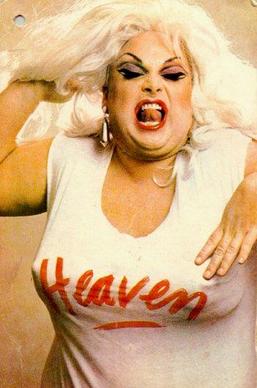Divine
[[ | 200px | right | thumb |]]
Relevance
Mentioned In
Discogs Information
Profile
Divine was a character created by American actor, singer and drag queen Harris Glenn Milstead (October 19, 1945 – March 7, 1988).
Harris Glenn Milstead's drag character Divine is most famous by their roles in John Waters films such as "Pink Flamingos," "Female Trouble," "Polyester" and Hairspray. In early 1970's Divine appeared in several avant-garde performances alongside San Francisco drag collective, The Cockettes, and later performed in Tom Eyen's off-Broadway plays "Women Behind Bars" and "The Neon Woman."
In 1982, American composer Bobby Orlando wrote a number of Hi-NRG singles for Divine, including "Native Love (Step By Step)," "Shoot Your Shot" and "Love Reaction."
Later in the 1980's Divine achieved global chart success with the Barry Evangeli and Stock Aitken & Waterman produced singles "You Think You're a Man," and "I'm So Beautiful."
Harris Glenn Milstead died aged 42 from cardiomegaly three weeks after the premiere of "Hairspray." After not showing up to shoot on the set of "Married With Children," he was found dead in his hotel room. Divine was described by People magazine as the "Drag Queen of the Century."
External Links
- https://www.discogs.com/artist/17142-Divine
- http://divineofficial.com
- http://divineofficial.tumblr.com
- http://www.dreamlandnews.com/divine
- http://www.blakstone.com/Dragstravaganza%20Site/divine.html
- http://en.wikipedia.org/wiki/Divine_(actor)
- https://de.wikipedia.org/wiki/Divine
- https://ja.wikipedia.org/wiki/%E3%83%87%E3%82%A3%E3%83%B4%E3%82%A1%E3%82%A4%E3%83%B3
Wikipedia Information
 |
Harris Glenn Milstead (October 19, 1945 – March 7, 1988), better known by the stage name Divine, was an American actor, singer and drag queen. Closely associated with independent filmmaker John Waters, Divine was a character actor, usually performing female roles in cinematic and theatrical productions and adopted a female drag persona for his music career. Born in Baltimore, Maryland to a conservative middle-class family, Milstead developed an early interest in drag while working as a women's hairdresser. By the mid-1960s he had embraced the city's countercultural scene and befriended Waters, who gave him the name "Divine" and the tagline of "the most beautiful woman in the world, almost". Along with his friend David Lochary, Milstead joined Waters' acting troupe, the Dreamlanders and adopted female roles for their experimental short films Roman Candles (1966), Eat Your Makeup (1968) and The Diane Linkletter Story (1969). Again in drag, he took a lead role in both of Waters' early full-length movies, Mondo Trasho (1969) and Multiple Maniacs (1970), the latter of which attracted press attention for the group. Milstead next starred in Waters' Pink Flamingos (1972), which was a hit on the U.S. midnight movie circuit, became a cult classic and established Milstead's fame in the American counterculture. After starring as the lead role in Waters' next film, Female Trouble (1974), Divine moved on to theater, appearing in several avant-garde performances alongside San Francisco drag collective, The Cockettes. He followed this with a performance in Tom Eyen's play Women Behind Bars and its sequel, The Neon Woman. Continuing his cinematic work, he starred in two more of Waters' films, Polyester (1981) and Hairspray (1988), the latter of which represented his breakthrough into mainstream cinema and for which he was nominated for the Independent Spirit Award for Best Supporting Male. Independent of Waters, he also appeared in several other films, such as Lust in the Dust (1985) and Trouble in Mind (1985), seeking to diversify his repertoire by playing male roles. In 1981, Divine embarked on a career in the disco industry by producing a number of Hi-NRG tracks, most of which were written by Bobby Orlando. He achieved international chart success with hits like "You Think You're a Man", "I'm So Beautiful" and "Walk Like a Man", all performed in drag. Described by People magazine as the "Drag Queen of the Century", Divine has remained a cult figure, particularly within the LGBTQ community, and has provided the inspiration for fictional characters, artworks and songs. Various books and documentary films devoted to his life have also been produced, including Divine Trash (1998) and I Am Divine (2013).